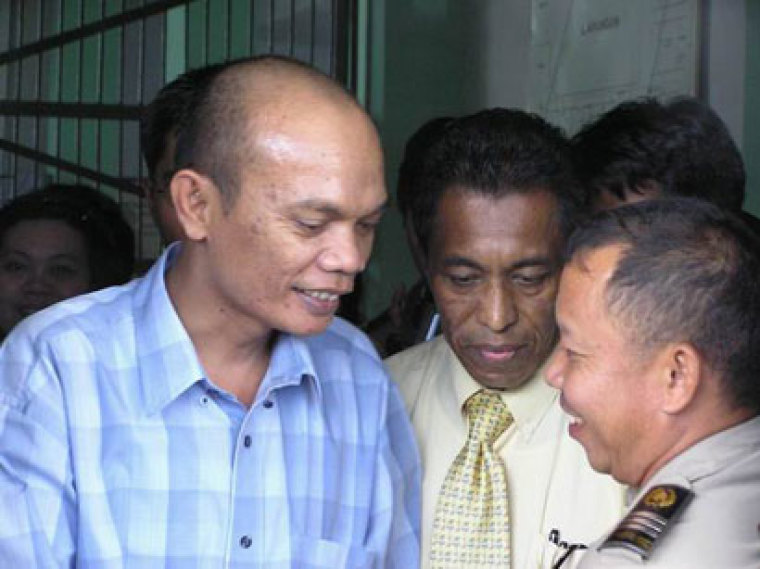
"The release of Pastor Damanik is really an answer to the prayers of thousands of Christians around the world," said Open Doors USA President Dr. Carl Moeller. "His release comes just days before the International Day of Prayer for the Persecuted Church Nov. 14. We need to keep on praying for other Christians in prison and all those who are being persecuted for their faith in Jesus Christ. The prayers of His people are so powerful!"
Friends, family and members of the press who gathered outside Maesa Detention Center early today faced an anxious two-hour wait until Damanik was finally brought out of the prison at around 10:30 a.m. local time, Open Doors reported.
After his release, Damanik spoke briefly to the press, expressing gratitude to all who had supported him during his arrest and imprisonment. He later met with an Open Doors staff member and said he was particularly grateful for the prayer, financial and moral support provided by the ministry.
During his time in prison, Damanik received a total of 26,866 letters and cards from Christians all over the world, many of which came in response to an Open Doors letter-writing campaign.
It was in June 2003 that Damanik was convicted on charges of "illegal weapons possession" and sentenced to three years' imprisonment in what supporters were convinced was done in a bid to silence him and to placate extremists.
Since then, Damanik has maintained his innocence, but appeals to both the High Court and the Supreme Court were unsuccessful. Damanik's fortunes began to change, however, when a leading Muslim cleric, Idrus Al Habsy, became good friends with the imprisoned pastor. Idrus, widely respected in Central Sulawesi, had been an advocate for Damanik and signed a written guarantee to the Minister of Justice and Human Rights declaring him to be a "man of good character" who "should be allowed to go free." The character reference, which Idrus signed just before he passed away on August 23 from illness, proved to be instrumental in securing Damanik's early release. Damanik said he was extremely grateful for the efforts of the respected Muslim cleric.
In an interview at Maesa Detention Center in late July, Damanik spoke of his plans following release. "When I leave, I will continue to do exactly what I was doing before I was arrested," he told an Open Doors staff member.
"I'm no hero," he added. "I'm just a normal human being. If there are any injustices being done by the government, I will again voice my opinion against it. I don't have any agenda -I'll just keep doing the same thing I did before.
"But there are two things I'd like to do if I could. First of all, I'd like to meet the refugees at different refugee camps to thank them for supporting me.
"Secondly, I'd like to thank all those who have written to me and encouraged me in the prison. All the people, including children, who sent me letters, cards, band-aids, lotion for my skin, and little chocolates with Scriptures written on them - you really touched my heart.
"I was amazed at the children who sent me pictures of trees and clouds and beautiful blue sky. Maybe they knew I couldn't see those things in the prison."
Damanik also had clear opinions on the sectarian conflict in Sulawesi, which began in the late 1990s. "From the beginning, I've said this is not a religious conflict," the pastor said. "The real causes are the injustices we live with - for example, corruption and favoritism, which are not being addressed or handled wisely by the government. This has prolonged the conflict."
Damanik can now look forward to resuming his work with the Christian Church of Central Sulawesi (GKST or Gereja Kristen Sulawesi Tengah) Crisis Center, which provides help to both Muslim and Christian victims of sectarian violence. Damanik was elected president of the GKST Synod on October 17, while he was still in prison.
Some have expressed fears that Damanik may become the next target of mysterious killers who have murdered at least six Christians and wounded 11 more on the island since April. Among the victims were Ferry Silalahi, who represented Damanik in court and was shot in May; and Rev. Susianty Tinulele, who visited Damanik in prison two days before she was shot during a church service on July 18.
Commenting on the response Christians should have to the violence, Damanik told Open Doors that the church needed to pray and bless their enemies. However, he stated, "We also need to show we are not cowards in facing this injustice. I'm not saying we should express our anger in revenge, but we need to speak the truth in love.
"Finally, we Christians should look at ourselves in the mirror and see what faults we have before pointing the finger at others. We need to clean up our own house first."
Parts of Central Sulawesi, about 1,000 miles northeast of the capital, Jakarta, were the scene of fighting between Muslims and Christians in the late 1990s that left more than 1,000 people dead. Unlike most of Indonesia where there is a Muslim majority, Central Sulawesi's population is evenly divided between Muslims and Christians.
Although large-scale violence has ended, there are still reports of sporadic attacks, mostly on Christian villages and places of worship.
Kenneth Chan
Ecumenical Press